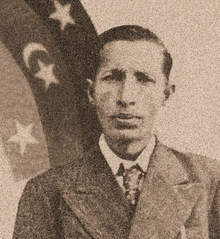Abdullah Afeef Didi
Abdullah Afeef Didi (according to another transcription also Abdulla Afif Didi ; * 1916 in the Maldives , † 1993 in the Seychelles ) was a Maldivian translator and politician . He became known as the first and only president of the internationally unrecognized republic of Suvadiva , which split off from the Sultanate of the Maldives in 1959. In 1963 he went into exile in the Seychelles .
Life
Abdullah Afeef Didi was born in 1916 as the son of Ali Didi in the Maldives, probably on Hithadhoo in Addu Atoll , where he also grew up. He belonged to an old, influential and wealthy family, which enabled him to have a private education in Egypt , where he learned English and Arabic .
When the British set up the Gan base (Atoll Addu) in the Addu Atoll during the Second World War , they hired Abdullah Afeef, who had previously returned from Egypt, as a translator and mediator between British soldiers and Maldivians.
In 1944 riots broke out in the Addu Atoll against the central government in Malé after it had imposed a trade ban between the British and the Maldivians and two police militiamen who were stationed in Addu to maintain the ban had committed acts of violence against locals. Although Abdullah Afeef Didi did not take an active part in the riots, he was arrested, convicted on the basis of false statements and publicly whipped in Malé , after which he was exiled to a remote island for several years.
The British base had been abandoned at the end of the war, but was reoccupied and rebuilt in 1957. After his release, Afeef worked for the British again. Maldivian Prime Minister Ibrahim Nasir eventually appointed Afeef as the official liaison officer between the British and the locals. Due to the Maldivian-British conflict over the base and general dissatisfaction with the government in Malé, an uprising broke out in Addu Atoll on January 1, 1959. Abdullah Afeef, who tried to avoid violence and was more pacifist , did not take part, but helped the persecuted government officials to flee to the British and thus saved their lives. As a result of the uprising, the Addu Atoll declared itself independent, the two more northern atolls followed, so that the Republic of Suvadiva was founded. The insurgents asked the British for support, but they asked for a trustworthy contact person. Only Afeef was considered for this, as he was the only inhabitant of the Addu Atoll who had a good relationship with the British and was at the same time educated and generally respected. The latter refused, however, as he regarded the secession as a failure from the start and feared the consequences. However, he was pushed into this role by the insurgents; after he and his family had been assured by the British of evacuation in the event of the failure of the republic, he accepted the position offered him. He was then officially appointed President of the Republic of Suvadivas.
As president, he wrote letters to the Times and to the High Commissioner in Ceylon , Sir Alexander Francis Morley , where he relatively unsuccessful seeking support.
After Prime Minister Nasir recaptured the two northern atolls, another uprising in Huvadhu Atoll was brutally suppressed and the British government finally reached an agreement with Nasir on the base, Suvadiva's end was sealed. On September 30, 1963, the last Suvadivian flag was lowered and the Maldivian flag was hoisted. As promised, the British military ship HMS Loch Lomond brought Abdullah Afeef Didi and his family into exile in the (then British) Seychelles .
In the Seychelles, Afeef made another career in the civil service; Even his children now hold important positions in government and business.
Shortly before his death, Abdullah Afeef Didi was allowed to return to the Maldives temporarily to visit relatives. He died in the Seychelles in 1993.
To this day, Afeef Didi is revered as a folk hero in the south of the Maldives.
Individual evidence
Web links
- maldivesculture.com - The United Suvadive Islands Republic (English)
- Maldive Royal Family - United Suvadive Republic (English)
| personal data | |
|---|---|
| SURNAME | Afeef Didi, Abdullah |
| ALTERNATIVE NAMES | Afif Didi, Abdulla |
| BRIEF DESCRIPTION | Maldivian politician and President of the Suvadiva Republic |
| DATE OF BIRTH | 1916 |
| PLACE OF BIRTH | Maldives |
| DATE OF DEATH | 1993 |
| Place of death | Seychelles |
